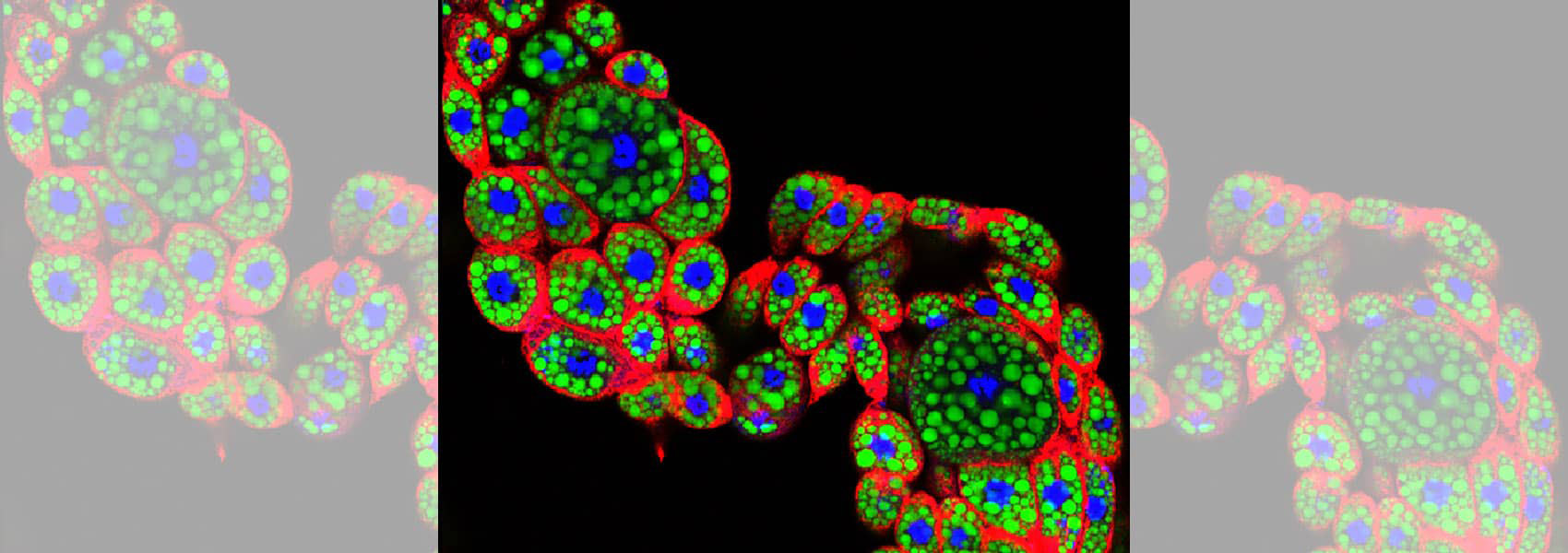Our long-term goal is to understand the regulatory mechanisms of how the transcriptional machinery is fine-tuned by signaling pathways and environmental perturbations in different developmental, physiological, and pathological contexts. Using the fruit fly Drosophila melanogaster and cultured mammalian cells as the experimental systems, we combine genetic, cell biological, and biochemical approaches to elucidate the conserved molecular and genetic regulatory circuits that control gene expression, lipid homeostasis, cell growth and proliferation during normal development and tumorigenesis. These efforts have led to the following three major research topics in the lab.
- Context-specific functions of the CDK8 module: The primary area is in elucidating the context-specific roles of the CDK8 module, a highly conserved module of the transcription cofactor Mediator complex, which bridges DNA-bound transcription factors and RNA polymerase II (Pol II) in eukaryotes. The four subunits of the CDK8 module - CDK8, Cyclin C, MED12, and MED13 - are either mutated or amplified in cardiovascular diseases and a number of human cancers. Elucidating the function and regulation of the CDK8 module in different biological contexts is essential to understanding the pathological consequences of its misregulation and to the design of clinical strategies to target the kinase activities of CDK8 in treating these diseases. We have identified two new downstream targets of CDK8, SREBP (sterol regulatory element-binding protein) and EcR (ecdysone receptor), as well as one upstream regulatory pathway of CDK8-CycC (the insulin/mTOR signaling pathway). Our results suggest that CDK8 coordinately regulates lipid biosynthesis by repressing SREBP-activated transcription and developmental timing by activating EcR-activated gene expression during the larval-pupal transition. In collaboration with Drs. Fajun Yang and Jeffrey Pessin at the Albert Einstein College of Medicine, we have found a conserved role of CDK8 in phosphorylating and destabilizing SREBP in Drosophila and mammalian cells. Interestingly, CDK8 is stabilized by nutrient deprivation and destabilized by feeding, suggesting a novel link between dietary perturbations and the general transcriptional machinery. Furthermore, cdk8 mutants are hyper-sensitive to dietary perturbations, particularly proteins and several specific amino acids, likely through the inhibitory effects of mTOR on CDK8. Further analyses of CDK8 functions and regulation may provide important insights to better understand how dysregulation of the CDK8 module contributes tumorigenesis and other diseases.
- The roles of Wnt signaling in regulating lipid homeostasis: We are interested in dissecting how developmental genetic pathways regulate lipid homeostasis during Drosophila larval development. Together with Dr. Wei Du at the University of Chicago, we have identified peptide boronic acids (PBAs) as potent inhibitors of Wnt signaling and fat metabolism defects caused by hyperactive Wnt signaling. Through developmental genetic analyses of Axin mutants in Drosophila, we have observed that hyperactive Wnt activity disrupts the lipid homeostasis in Drosophila larvae, which can be potently mitigated by feeding the mutant larvae with Bortezomib and two additional PBAs. Interestingly, the suppressive effect of PBAs on hyperactive Wnt signaling is dependent on α-catenin: the rescue effect is abolished with the depletion of α-catenin in adipocytes. These results suggest that pharmacological modulation of β-catenin activity through α-catenin can potentially be an attractive approach to attenuate Wnt signaling in vivo.
- Epigenetic regulation of chromatin dynamics and gene expression: In an independent line of research, we have been interested in how chromatin dynamics is regulated in development. We performed the first systematic genetic analysis of dKdm2 mutant alleles and demonstrated that the Drosophila histone lysine demethylase dKdm2 gene is not an essential gene for viability and normal development, which has been confirmed by our newly generated dKdm2 null alleles using the CRISPR/Cas9 technique. In collaboration with Dr. Yong Zhang at the University of Nevada and Dr. Jian-quan Ni at the Tsinghua University, we have observed that dKDM2 is involved in regulating circadian rhythms in Drosophila. Further analyses of the molecular mechanisms of dKDM2 and its orthologs in vertebrates regarding the regulation of circadian rhythms will advance our understanding of the epigenetic regulations of circadian clock.
Candidates interested in graduate study in the Ji laboratory at the Tulane University are encouraged to apply through the following program: https://medicine.tulane.edu/education/biomedical-sciences-graduate-program

